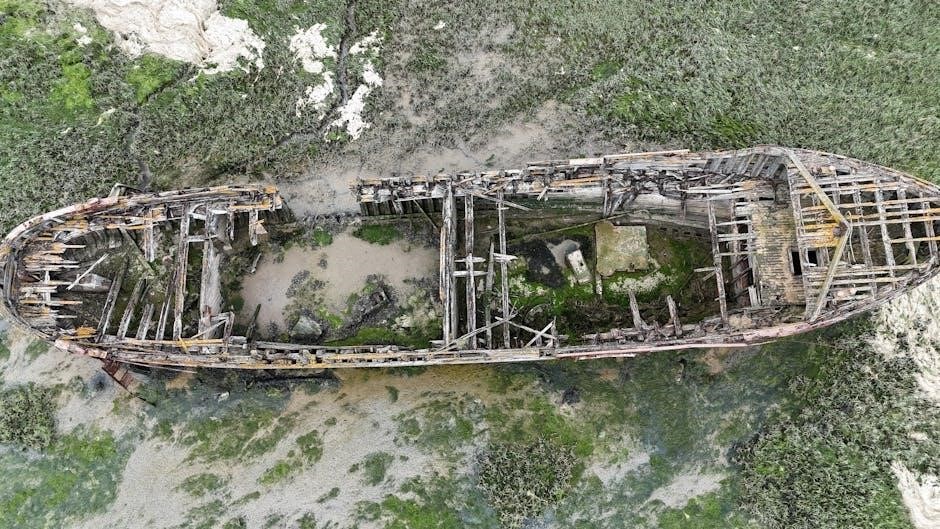maritime english for warships officers pdf
Maritime English is essential for warship officers to ensure clear, standardized communication, enhancing safety and operational efficiency. It involves specific terminology, protocols, and resources like PDF guides for effective training and compliance with international standards.
Overview of Maritime English
Maritime English is a specialized form of communication designed for clear, concise, and standardized interactions at sea. It ensures safety, efficiency, and compliance with international maritime standards. Warship officers rely on this structured language to coordinate operations, navigate, and respond to emergencies effectively. Resources like PDF guides and training materials are widely available, emphasizing its importance for seafarers. Proper use of Maritime English aligns with global frameworks, ensuring seamless communication across diverse crews and operational scenarios.
Importance of Effective Communication at Sea
Effective communication is critical for maritime operations, ensuring safety, clarity, and precision. Miscommunication can lead to accidents, delays, or operational errors. Clear language helps bridge cultural and professional gaps, fostering teamwork. Standardized phrases and protocols minimize misunderstandings, especially in high-stress situations. Officers rely on precise communication to coordinate maneuvers, respond to emergencies, and maintain order. Enhanced communication skills reduce risks, improving overall efficiency and safety at sea.
Key Components of Maritime English
Maritime English includes standardized communication phrases, specialized vocabulary for naval operations, and precise terminology to ensure clarity and safety at sea.
Standard Marine Communication Phrases (SMCP)
Standard Marine Communication Phrases (SMCP) are predefined expressions ensuring clarity and precision in maritime interactions. They minimize errors, especially during emergencies. Phrases like “Mayday” and “Pan-Pan” signal distress levels, while others confirm commands or report statuses. SMCP phrases are universally recognized, facilitating teamwork across diverse crews. Regular training ensures officers master these phrases, critical for safety and operational efficiency at sea.
Vocabulary Specific to Warship Operations
Warship operations require a specialized vocabulary focusing on tactical maneuvers, weapon systems, and command structures. Terms like “port” and “starboard” define ship directions, while “aft” and “forward” specify sections. Phrases such as “general quarters” signal battle readiness. Understanding this lexicon ensures precise communication, critical for safety and operational success. Officers must master these terms to execute commands effectively and maintain coordination during naval missions.
Understanding Maritime Terminology
Maritime terminology refers to the specialized language used in the maritime industry, including terms for ship parts, navigation, and safety procedures; Understanding this terminology is crucial for clear communication among officers. It includes phrases like “keel,” “ballast,” and “hull,” which describe ship structures. Familiarity with these terms ensures precision in commands and reports. Officers must grasp both general maritime terms and those specific to warships to maintain operational efficiency and safety at sea.
Communication Protocols for Warship Officers
Communication protocols for warship officers involve standardized procedures, clear language, and precise commands to ensure safety and efficiency in maritime operations.

Standard Operating Procedures (SOPs) in Communication
Standard Operating Procedures (SOPs) in communication are critical for ensuring consistency and efficiency in maritime operations. These structured guidelines outline protocols for routine and emergency situations, reducing errors. SOPs cover pre-departure checks, watch changes, and distress signals, ensuring all crew members understand their roles. By adhering to SOPs, officers maintain clear, concise communication, minimizing misunderstandings. Regular drills and training reinforce these procedures, aligning with international maritime standards like those set by the IMO. Effective SOPs foster trust and compliance, ensuring seamless operations at sea.
Emergency Communication Practices
Emergency communication practices are vital for ensuring safety and rapid response during critical situations. Officers must use standardized phrases like “MAYDAY” or “PANDEMONIUM” to signal distress clearly. Clear, concise language is essential to avoid misunderstandings. Regular drills and adherence to SOPs ensure preparedness. Use of emergency beacons (EPIRBs) and radios complements verbal communication. Timely and accurate reporting of incidents ensures swift assistance, safeguarding lives and vessels. Proper training in these practices is non-negotiable for all crew members.
Clear and Concise Reporting Techniques
Clear and concise reporting is critical for effective communication aboard warships. Officers must avoid ambiguity, ensuring messages are straightforward and easily understood. Standardized phrases and structured formats minimize errors. Use of precise terminology and avoidance of unnecessary jargon ensure clarity. Reports should focus on essential details, prioritizing accuracy and relevance. Utilizing checklists or templates can enhance consistency. This approach ensures timely decision-making and operational efficiency, safeguarding crew and mission success.

Training and Resources
Structured programs and experienced instructors provide comprehensive training. Resources include manuals, guides, and digital tools to enhance learning. These materials cover essential topics for effective communication and safety at sea.
Maritime English Training Programs
Maritime English training programs are designed to enhance language proficiency, focusing on vocabulary, syntax, and pronunciation specific to naval operations. These programs often include practical exercises, simulations, and case studies to ensure officers can communicate effectively in high-stress environments. Training modules are structured to align with international standards, ensuring compliance with safety and operational protocols. Experienced instructors guide participants through interactive sessions, fostering a collaborative learning environment. Regular assessments are conducted to monitor progress and identify areas for improvement. The goal is to equip officers with the linguistic skills necessary for clear, concise, and accurate communication, critical for mission success and crew safety.
Utilizing PDF Resources for Self-Study

PDF resources are invaluable for self-study in Maritime English, offering structured learning materials tailored for warship officers. These documents often include vocabulary lists, communication scenarios, and exercises specific to naval operations. Officers can access them anytime, making self-study flexible and efficient. PDF guides typically align with international standards, ensuring relevance and accuracy. They also provide practical examples and reference materials, aiding in the mastery of maritime terminology and communication protocols. Regular review of these resources enhances proficiency and preparedness for real-world applications.
E-Learning Platforms for Continuous Development
E-learning platforms offer flexible and interactive ways for warship officers to enhance their Maritime English skills. These platforms provide access to courses, quizzes, and simulations tailored to naval communication. Officers can engage in self-paced learning, reviewing materials anytime and anywhere. Many platforms include real-time feedback, enabling immediate improvement. Additionally, they often feature collaborative tools, such as forums, fostering a community of learners. This modern approach ensures continuous skill development and adapts to the evolving needs of maritime professionals.

International Standards and Certifications
International standards, led by the IMO, ensure uniformity in maritime communication. Certifications like those under the STCW Convention mandate English proficiency for officers, safeguarding global maritime operations;
Role of the International Maritime Organization (IMO)
The IMO plays a pivotal role in establishing standardized maritime communication protocols, including Maritime English, to ensure safety and efficiency at sea. It develops and implements global regulations, such as the Standard Marine Communication Phrases (SMCP), which are essential for clear and unambiguous messaging. The IMO also collaborates with member states to certify officers’ language proficiency, ensuring compliance with international safety standards. This oversight fosters uniformity in communication practices worldwide.

STCW Convention Requirements for English Proficiency
The STCW Convention mandates that all seafarers, including warship officers, demonstrate proficiency in Maritime English. This ensures effective communication during operations and emergencies. Officers must meet specific standards in speaking, listening, reading, and writing. Compliance is verified through certified training programs and assessments. Non-compliance risks safety and may lead to legal consequences, emphasizing the critical need for adherence to these proficiency requirements.
Certification Processes for Officers
Warship officers must undergo rigorous certification processes to ensure Maritime English proficiency. This involves passing standardized tests and completing approved training programs. Certificates are issued by accredited institutions, verifying competence in communication, terminology, and reporting. Officers must adhere to these standards to maintain operational readiness and compliance with international maritime regulations. Regular recertification is required to uphold proficiency levels and ensure seamless communication during critical operations at sea.
Practical Applications
- Maritime English is crucial for navigation, tactical operations, and emergency responses at sea.
- Officers use standardized phrases and protocols to ensure clear communication during critical situations.
- Effective language skills enhance teamwork, reduce errors, and improve overall mission success.
Case Studies in Effective Communication
Real-life scenarios demonstrate how clear communication prevents accidents and enhances operations. For instance, during navigation in busy shipping lanes, precise language ensures safe maneuvering. In rescue operations, concise reporting facilitates swift responses. These examples highlight the importance of standardized phrases and protocols. Training programs often incorporate such case studies to improve officers’ skills. Effective communication strategies are critical for mission success and crew safety, as evidenced by historical incidents and modern naval operations.
Handling Miscommunication Incidents
Miscommunication at sea can lead to critical errors, requiring immediate resolution. Officers must remain calm, clarify ambiguities, and confirm instructions. Structured follow-up protocols ensure understanding. Active listening and clear language are essential. Documenting incidents helps identify patterns and improve systems. Training emphasizes recognizing and addressing miscommunication promptly to prevent escalation. Regular drills and simulations also prepare officers to manage such situations effectively, ensuring operational safety and efficiency. Clear communication protocols are vital in high-stakes environments.

Simulation Exercises for Training
Simulation exercises are vital for honing maritime English skills in realistic scenarios. They replicate actual operations, allowing officers to practice clear communication under pressure. Exercises include navigational maneuvers, emergency responses, and tactical operations. Participants use standardized phrases and protocols, reinforcing proper language usage. Feedback sessions and debriefs help identify areas for improvement. These simulations enhance situational awareness, teamwork, and decision-making, ensuring officers are prepared for real-life challenges at sea.

Psychological Aspects of Communication
Effective communication requires understanding psychological factors like stress, fatigue, and cultural differences. Officers must manage emotions and biases to ensure clear, accurate, and respectful interactions.
Stress Management in High-Pressure Situations
Managing stress is critical for warship officers, as high-pressure environments demand clarity and focus. Techniques like deep breathing, mental exercises, and structured communication help maintain calm. Clear, concise language reduces errors and enhances teamwork. Officers must prioritize self-awareness and emotional regulation to ensure effective decision-making. Stress management training fosters resilience, enabling officers to perform optimally in emergencies. A composed mindset is essential for accurate communication and crew safety.
Team Dynamics and Communication
Effective team dynamics rely on clear, precise communication among crew members. Standardized maritime English ensures shared understanding, reducing errors. Active listening and assertiveness foster collaboration, while defined roles prevent confusion. Positive communication strengthens trust and cohesion, critical for high-stakes operations. Officers must balance authority with approachability, encouraging open dialogue for better decision-making and mission success. Unified teams achieve operational excellence through reliable, professional interaction.
Cultural Sensitivity in Multinational Crews
Cultural sensitivity is vital in multinational crews, as differences in language, customs, and values can impact communication. Officers must recognize and respect these variations to avoid misunderstandings. Using standardized maritime English minimizes errors, while awareness of cultural nuances enhances collaboration. Open-mindedness, patience, and inclusive language foster a harmonious working environment. Bridging cultural gaps ensures effective teamwork, mutual respect, and successful operations at sea. Diversity becomes a strength when managed with empathy and understanding.
Future Trends
Advancements in technology, AI integration, and evolving training methods will shape maritime English. Enhanced communication systems and real-time translation tools will improve efficiency and safety at sea.
Advancements in Communication Technology
Modern maritime communication relies on advanced technologies like satellite systems and digital platforms. These tools enhance reliability, speed, and clarity, ensuring seamless operations at sea. Automated systems reduce human error, while AI-driven solutions improve message interpretation. Enhanced encryption secures sensitive information, safeguarding naval operations. These innovations transform traditional practices, enabling faster decision-making and improving overall safety. Officers must adapt to these technologies to maintain operational efficiency and compliance with global standards.
Integration of AI in Maritime Communication
AI is revolutionizing maritime communication by enhancing accuracy and efficiency. Natural language processing enables real-time translation, breaking language barriers. Predictive systems analyze data to anticipate communication needs, reducing errors. AI-powered tools assist in generating clear reports and alerts, ensuring compliance with protocols. Machine learning improves speech recognition, aiding in complex operations. These advancements streamline workflows, fostering better collaboration and decision-making among multinational crews. AI integration is reshaping how officers communicate, ensuring precision and reliability in critical situations.
Evolution of Training Methods
Maritime English training has transitioned from traditional classroom methods to digital platforms. E-learning tools now offer flexible, self-paced learning for officers. Interactive simulations mimic real-life scenarios, enhancing practical skills. AI-driven systems provide personalized feedback, improving pronunciation and comprehension. Modern methods emphasize hands-on practice, ensuring officers are proficient in Standard Marine Communication Phrases and warship-specific terminology. These advancements ensure that training is engaging, effective, and adaptable to the demands of modern naval operations.
Mastery of Maritime English is vital for safe and efficient warship operations. It ensures clear communication, reduces errors, and enhances professionalism among officers, safeguarding crew and mission success.
Final Thoughts on the Importance of Maritime English
Maritime English is indispensable for warship officers, ensuring clarity and precision in critical situations. It minimizes misunderstandings, enhances operational safety, and promotes professionalism. Effective communication fosters teamwork and swift decision-making, which are vital at sea. Proficiency in Maritime English is not just a skill but a necessity, directly impacting mission success and crew safety; Its mastery remains a cornerstone of modern naval operations.

Additional Resources
Explore recommended maritime English guides, online forums, and workshops to enhance your skills. Utilize PDF materials and e-learning platforms for continuous professional development and knowledge sharing.
Recommended Reading and Materials
Access authoritative guides like “Maritime English: A Guide for Officers” and “Standard Marine Communication Phrases” for comprehensive learning. Download PDF resources from reputable maritime institutions, such as the International Maritime Organization (IMO). These materials include vocabulary lists, practical scenarios, and exercises tailored for warship operations. Utilize e-books and workbooks focusing on naval terminology and communication protocols. Such resources are essential for enhancing proficiency and staying updated with industry standards.
Online Communities and Forums
Engage with online platforms like Maritime Forums and Naval Communicators Groups to connect with professionals and share insights. Participate in discussions on LinkedIn groups dedicated to maritime English. These forums offer valuable resources, including PDF guides and webinars. Join specialized Reddit communities for real-time feedback and practical advice. Such platforms foster collaboration and provide access to updated materials for continuous improvement in maritime communication skills.
Workshops and Seminars
Workshops and seminars are vital for advancing maritime English proficiency. Organized by institutions like the IMO and maritime academies, these events offer interactive learning through practical exercises and real-life simulations. Officers can refine their use of standard marine phrases and grasp complex terminology. Networking with experts and peers enhances understanding. Many workshops provide PDF resources and certificates, ensuring officers are adept in clear communication, crucial for safe and efficient naval operations.

Final Word
Continuous learning and mastery of maritime English are essential for warship officers, ensuring effective communication and safe naval operations. Stay vigilant, as clear language is key to success.
Encouragement for Continuous Learning
Continuous learning is vital for warship officers to maintain proficiency in maritime English. Regular practice with PDF guides, e-learning platforms, and workshops enhances communication skills. Engaging in online forums and simulations fosters practical application. Embrace lifelong learning to stay updated on evolving terminology and protocols. Dedication to improving maritime English ensures safer operations and effective teamwork. Remember, clear communication is the cornerstone of success in naval operations. Keep striving for excellence in this critical skill.
Acknowledgment of the Critical Role of Officers
The role of warship officers is paramount in ensuring the safety, security, and efficiency of maritime operations. Their ability to communicate clearly and effectively is crucial, especially in high-stress environments. Mastery of maritime English enables them to convey critical information, coordinate actions, and make swift, accurate decisions. Their professionalism and dedication are vital in upholding international standards and safeguarding lives at sea. Recognizing their efforts underscores the importance of their expertise.